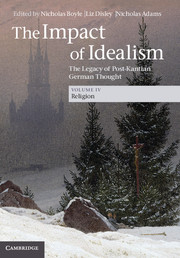Book contents
- Frontmatter
- Contents
- List of Contributors
- Acknowledgements
- List of Abbreviations
- Introduction: the impact of Idealism on religion
- 1 The impact of Idealism on Christology: from Hegel to Tillich
- 2 German Idealism's Trinitarian legacy: the nineteenth century
- 3 German Idealism's Trinitarian legacy: the twentieth century
- 4 Kierkegaard, Hegelianism and the theology of the paradox
- 5 Biblical hermeneutics: from Kant to Gadamer
- 6 Aesthetic Idealism and its relation to theological formation: reception and critique
- 7 The autonomy of theology and the impact of Idealism: from Hegel to radical orthodoxy
- 8 Faith and reason
- 9 Rabbinic Idealism and Kabbalistic realism: Jewish dimensions of Idealism and Idealist dimensions of Judaism
- 10 ‘In the arms of gods’: Schelling, Hegel and the problem of mythology
- 11 Dialectic and analogy: a theological legacy
- Bibliography
- Index
- References
5 - Biblical hermeneutics: from Kant to Gadamer
Published online by Cambridge University Press: 05 December 2013
- Frontmatter
- Contents
- List of Contributors
- Acknowledgements
- List of Abbreviations
- Introduction: the impact of Idealism on religion
- 1 The impact of Idealism on Christology: from Hegel to Tillich
- 2 German Idealism's Trinitarian legacy: the nineteenth century
- 3 German Idealism's Trinitarian legacy: the twentieth century
- 4 Kierkegaard, Hegelianism and the theology of the paradox
- 5 Biblical hermeneutics: from Kant to Gadamer
- 6 Aesthetic Idealism and its relation to theological formation: reception and critique
- 7 The autonomy of theology and the impact of Idealism: from Hegel to radical orthodoxy
- 8 Faith and reason
- 9 Rabbinic Idealism and Kabbalistic realism: Jewish dimensions of Idealism and Idealist dimensions of Judaism
- 10 ‘In the arms of gods’: Schelling, Hegel and the problem of mythology
- 11 Dialectic and analogy: a theological legacy
- Bibliography
- Index
- References
Summary
‘The approach to the Christian religion that is flourishing in our time’, the young Hegel wrote in 1795, ‘…takes reason and morality as the basis of its analysis and as an aid to elucidation calls on the spirit of the nations and the ages.’ Two figures above all must have been in his mind as representative of the two great currents that he thought were renewing Christian thinking: Kant (‘reason and morality’) and Herder (‘the spirit of the nations and the ages’). In Kant's treatise, Religion within the Boundaries of Mere Reason, published two years previously, the heritage of critical and rationalist deism had been given newly powerful expression through its fusion with a moral theory centred on human freedom and autonomy. Herder, both pupil and declared adversary of Kant, whom he surpassed both in learning and in linguistic ability, had for over two decades been attempting to synthesise the rapidly growing wealth of historical, philological and anthropological knowledge about the nations, literatures and religions of the world into a universal history that both respected human variety and explained the unique position he, as an ordained minister, attributed to Christianity. Hegel himself soon came to realise that two such potent and antagonistic thinkers could not, by a mere verbal gesture, simply be waved together into a single contemporary ‘approach to the Christian religion’. On the contrary, they represented two conflicting forces, both of which, from different, perhaps opposite directions, threatened the Bible-based, Lutheran Christianity in which he, like them, had been brought up.
- Type
- Chapter
- Information
- The Impact of IdealismThe Legacy of Post-Kantian German Thought, pp. 114 - 141Publisher: Cambridge University PressPrint publication year: 2013



